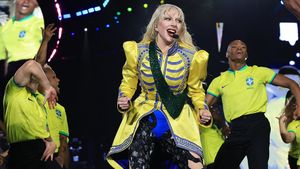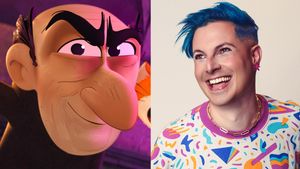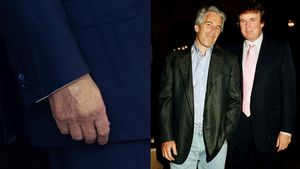Almost 1,000 years after lacrosse was first played on fields that stretch across the Haudenosaunee Confederacy, the sport will be on the 2028 Olympic schedule in Los Angeles.
It is still unknown whether Haudenosaenee, a collection of six indigenous nations whose territory covers upstate New York and adjacent sections of Canada, will have a spot at the Olympics.
The International Olympic Committee currently holds a decades-old tradition of allowing only participants from countries with a national Olympic committee, but some say the organization could find a way to include players under the Haudenosaunee (formerly known as the Iroquois) flag.
According Leo Nolan, the executive director of the Haudenosaunee national team, a move like that would pay homage to the sport’s Indigenous roots in a world that seeks more inclusivity and diversity.
“Growing up an Onondagan, when we had a game in our territory, the whole community came out,” Nolan told the Associated Press. “It’s a community spirit, not just a sport. It’s an integral part of who we are and what we’re about. How many other sports have that kind of wherewithal, something that has a true meaning? I don’t know of many sports that have the same spiritual meaning that this has.”
Telling Queer Indigenous Stories Through Art

Organizers for the Los Angeles Olympics worked with World Lacrosse, the sport’s international federation, to lean heavily into the Indigenous history of the sport in an effort to convince the IOC to bring lacrosse back into the games as a metal event for the first time since 1908.
The sport's history goes back all the way to approximately 1100 AD, when tribes in northeastern North America often played games with more than 100 men on a side. Lacrosse also helped tribes prepare for wars and was also a focal point of social gatherings, a religious and sometimes a diplomatic tool used to settle disputes. Then, when Canadian settlers saw the sport, a dentist named George Beers wrote the first rulebook for the sport in 1867.
The Haudenosaunee national team was established in 1983 and have participated in the world championships since 1990. The Haudenosaunee men’s team won its first world bronze medal in 2014 and last year finished fifth (out of eight) at the Olympic-style World games. The women’s team finished in seventh.
In order to compete, both the United States and Canada had to sign-off and the team from Ireland sacrificed its own spot to allow the team to play. The decision on whether they can compete in the Los Angeles Olympics will rest with the IOC.
A spokesperson for the Los Angeles Games told AP, “together, we intend to find creative solutions that honor the sport’s heritage and allow participation for Haudenosaunee athletes, while respecting the Olympic Games framework established by the IOC.”
While Nolan hopes that the Haudenosaunee will play on the world's biggest stage, he said that the Olympic attention is a victory in itself.
“I think there are Olympic people involved who know this is really important, not just for Indigenous communities, but for all of us,” Nolan said. “It's a chance for us to share, more and more, about who we are and what we're all about.”
- Ben & Jerry's Call For Mount Rushmore to Be Returned to Native Americans ›
- Professional Sports Teams Are Dropping Native Mascots, But What About High Schools? ›
- Indigenous Communities Once Again Criticize Avatar for Harmful Stereotypes ›
- Is it Columbus Day or Indigenous People's Day? We Can't Have It Both Ways ›


















































